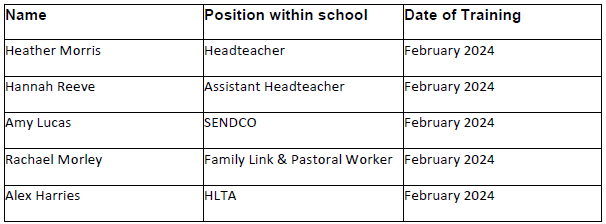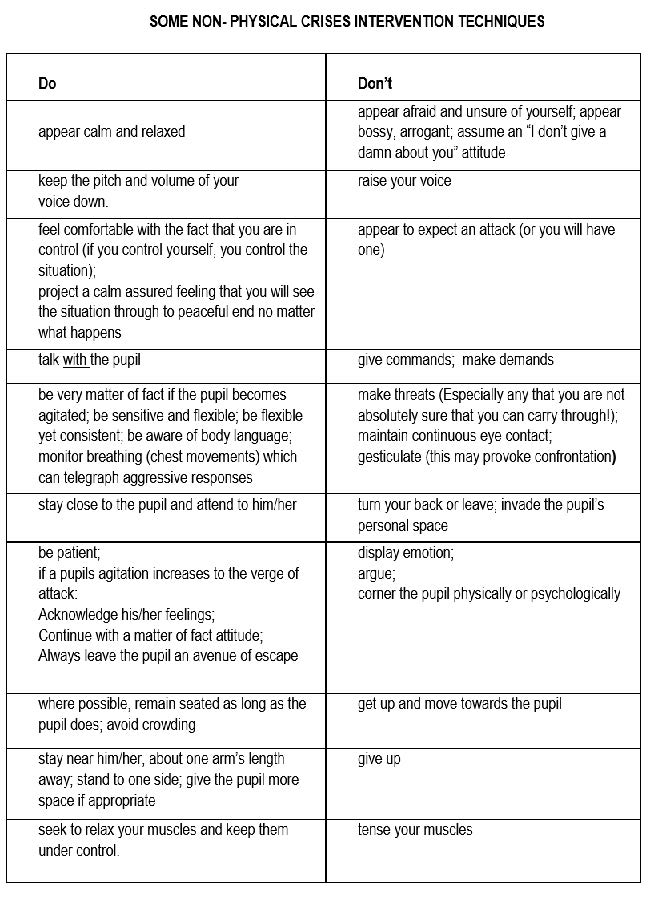Wicklea Academy aims to provide a safe, caring and friendly environment for all its pupils to allow them to learn effectively, improve their life chances and help them maximise their potential. The Academy takes the safety of pupils and staff very seriously. The Academy believes that all pupils and staff have the right to be safe and feel safe whilst at school or on a school-run activity.
This policy should be read in conjunction with the following policies:
This policy was formulated in consultation with the whole trust and whole school community with input from members of staff, Academy Council members, parents/carers, children and young people, and other partners. This policy is also written in line with national and local policy on the same subject.
This policy considers the legal requirements as outlined in the following legal framework:
This policy has due regard to all relevant legislation including, but not limited to, the following:
This policy has due regard to the following guidance:
Each Academy will appoint a member of their Senior Leadership Team with the necessary status and authority to be the responsible member of staff to oversee the application of the Positive Handling Policy. It may be that this is something that the Designated Safeguarding Lead or Deputy Designated Safeguarding Lead has the overview of, within their role of being responsible for matters relating to child protection and welfare who will attend senior leadership meetings to report on, plan and help implement Safeguarding across the Academy.
The overall responsibility for the appropriate application of this policy lies with the Senior Leadership Team. A key element of the application of the policy is the regular and timely training, which needs to be clearly tracked and monitored to ensure that all the relevant staff have specific training on the use of reasonable force, within the context of our Positive Handling approach.
The Academy is firmly committed to creating a calm and safe environment which minimises the risk of incidents arising that might require the use of reasonable force. Staff use the PSHE curriculum to explore and strengthen emotional responses to situations. Staff will only use reasonable force as a last resort and strongly believe in de-escalating any incidents as they arise to prevent them from reaching a crisis point. Staff will be skilled in promoting and rewarding positive behaviour and will utilise various appropriate techniques in the management of a class environment. Staff will only use reasonable force when the risks involved in doing so are outweighed by the risks involved by not using force.
The Principal at Wicklea Academy is empowered to authorise those members of her staff who are enabled to use reasonable force. At Wicklea Academy the Principal has empowered the following members of staff to use reasonable force:
All members of school staff have a legal power to use ‘reasonable force’.
Under English law, members of staff are empowered to use reasonable force to prevent a pupil from or stop them continuing:
It is each member of staff’s responsibility to make an assessment of the particular circumstances. Staff will need to decide if control is appropriate, and if it is, at what level. It is not considered appropriate at to adopt a blanket approach to the use of Restrictive Physical Intervention simply because a pupil may have emotional and behavioural difficulties. Staff will need to take the following factors into consideration:
This could include the following situations:
The Academy will ensure that all staff have an understanding of de-escalation skills as well as ensuring that a wide range of staff receive physical intervention training to manage challenging behaviour. The overall model would be to train all staff with a broad understanding and the de-escalation approaches and strategies that are part of overall culture. Wicklea Academy has embraced the Team Teach approach to positive handling.
The Team-Teach approach will:
Although all staff can use reasonable force for situations outlined in the above paragraph all academies will also be required to have a number of staff trained in the use of the Team Teach positive handling approach.
There is a CLF requirement that all CLF Academies have a minimum number of staff trained in this approach as outlined below:
Please include in the table below the names of all staff members that have received Positive Handling Training – the content of this table may be stored separately to the policy, and should be kept live by the Operations Lead/SLT within an Academy.

Staff are also expected to remember that physical intervention is only one option and for behaviours involving extreme levels of risk it may be more appropriate to gain support from other agencies, including the police. Staff will be kept informed and have a duty to inform others about the plans around specific pupils who can present risks to themselves and others. This may include information about any specific SEN needs, personal circumstance and temporary upset. The information gathered here may be captured in the form of CLF Contextual Safety Plans.
Positive Behaviour Plans may be put in place for pupils who are known to display behaviours that may lead to them becoming distressed or violent, contextual safety plans can also be used effectively in this case. In these circumstances it may be reasonable to withdraw the child to a safer place when the pattern of behaviour begins, rather than wait until the child is distressed and out of control. The overriding factor is that action is taken in the interest of the child to reduce rather than increase the risk.
When using force, members of staff should only use the minimum amount of force required in achieving the required outcome. It should never be carried out in a situation that involves anger.
When considering physical intervention staff should think about the following questions:
If staff can answer these questions then it is more likely that physical intervention will be judged reasonable and proportionate.
Staff should, where possible, avoid any type of intervention that is likely to injure a pupil, unless in the most extreme of circumstance where there was no viable alternative. Also staff should avoid using force unless a designated Team Teach trained member of staff or until another member of staff is present to support, observe or call for assistance.
Other considerations:
The expectation of this Academy is that all staff support one another by offering help but this does not mean taking over a situation. Staff make clear what help they need and use the following scripts to make clear what sort of assistance they need.
Scripts that may be used include:
When a child is being held due to others being at risk, or they are at risk of hurting themselves, others, destroying property etc. A well-chosen word can sometimes avert an escalating crisis. There is no point getting into an argument when pupils are getting angry. Telling people to calm down or pointing out what they have done wrong can escalate the incident further. It is better to say nothing and take time to think of what to say rather than saying the wrong thing and risk provoking an escalation of behaviour.
In the ordinary course of maintaining a supportive and stable educational experience, staff may limit pupil’s liberty by requiring them not to do things that they may prefer to do, including restricting them within a building. However, if the pupil complies with the reasonable request, restriction of liberty is not an issue.
There may be occasions, however, when a pupil has lost self-control, and is intent on serious self-damage; inflicting injury on others; damage to property, or is considered potentially likely to do so, that it would be appropriate to prevent access to dangerous environments by locking doors to them. Restricting access under such circumstances is considered appropriate staff action.
All documentation must be kept in line with the Federation data storage policy
In addition to the above, Team Teach strongly recommends that all services should keep records / copies of incidents of restraint, for a minimum period of 25 years from the date of the incident.
The behaviour of some individuals presents a hazard to themselves and others. In settings which cater for individuals who exhibit hazardous behaviours, records serve a number of purposes:
Records:
The Principal/SLT should monitor the use of Restrictive Physical Intervention, particularly Restrictive Physical Intervention (RPI), by examining:
The Principal will ensure that:
It is the responsibility of any member of the school’s staff team to alert a member of the Senior Leadership Team of any concerns they have regarding any individual pupils in their care.
Following the use of physical intervention, staff and pupils will be supported, the immediate physical needs of all parties will be met and staff will ensure that positive relationships are maintained.
Where necessary emotional or wellbeing support will be offered to staff and where necessary further training will be given. Pupils will be allowed time to calm down before they return to their classroom environments. The incident will be discussed with pupils and appropriate support and sanctions implemented. Sometimes it is more appropriate to discuss events with pupils later in the day when they are more receptive to discussion.
Parents will also be notified and appropriate action and support agreed for their child.
All incidents will be logged as outlined in section 14.
Parents and carers are entitled to information on the behavioural management and positive handling techniques which staff employ in last resort situations or as part of a documented planned response to a student’s behaviour. The responses should be documented in the students Positive Behaviour Plan.
When appropriate, they are also invited to contribute to their child’s individual Positive Behaviour Plan/ Contextual Safety Plan. It is considered ‘good practice’ for Parents / Carers to be given/have available a copy of the school’s policy on the use of reasonable force (Policy, along with the Behaviour Management Policy) to read. It is also good practice to demonstrate the hold which may be used with their young person, allowing the parents/carers to experience the hold where the parents/carer are willing.
Wicklea Academy recognises the contribution it can make to protect its children and support pupils and staff in school. The aim of the CLF Complaints Policy is to provide clear guidelines for the handling of any complaints.
The academy will also make clear to pupils that they have a right, and are able, to question/complain about the use of reasonable force. The Academy will ensure that mechanisms are in place for pupils, parents, carers and staff to voice the opinions, comments or concerns. Please refer to CLF complaints policy for further information.
Complaints and allegations will be taken seriously and will be investigated by the Principal/relevant member of the SLT/Executive team and outcomes discussed with the relevant parties. Appropriate procedures will be followed and Academy Council involved if necessary.

